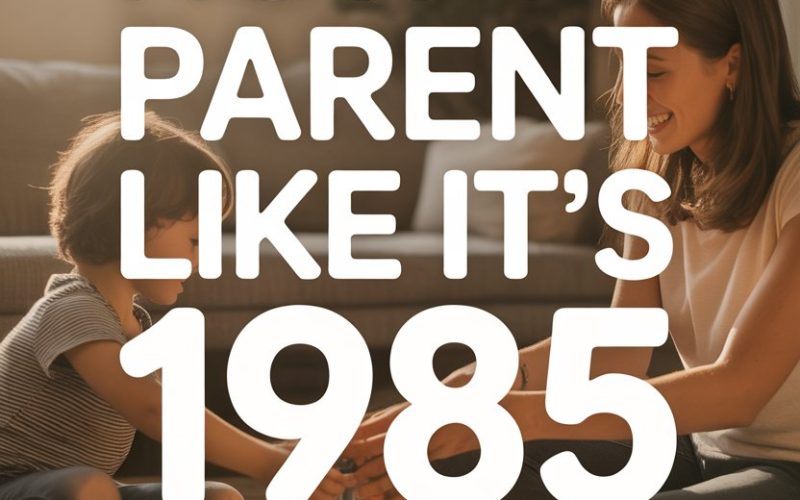Ah, 1985—the year Marty McFly hit 88 miles an hour, Madonna told us to get “Into the Groove,” and every child’s main job was to be back home by sunset.
Fast forward to today, where screen time is policed more strictly than the border in an action movie, toddler birthday parties come with colour-coded schedules, and the mere mention of “free-range parenting” causes a collective parental gasp.
Still, something about parenting back then seems, well, easier. Was it all Care Bears and BMXs, or is there a bit we can actually learn from? Here’s how to recapture the best of that era—without the cigarette smoke in the lounge, lead paint, or letting your eight-year-old ride in the boot.
Ditch the Over-Scheduling
Let’s be honest: the average 10-year-old’s Google Calendar could give a CEO heart palpitations. Soccer, coding camp, Mandarin lessons, and that’s just Tuesday.
Back in 1985, there was a time and place for extracurriculars, but afternoons were mostly reserved for “playing outside”—which, as every adult knows, is code for “coming home muddy and exhausted, with at least one new bruise.”
Try this: leave one afternoon (or even a whole weekend day) completely blank. Let your child decide what to do, even if that means flopping face-down on the rug to gaze at the ceiling for half an hour.
Boredom? That’s just another word for creativity waiting to happen, according to experts who study child development.
Sure, you might get complaints. “I’m booooored.” Excellent. Hand them a cardboard box and a couple of markers and see what happens—no Pinterest inspiration required.
Let Kids Roam (At Least a Little)
You probably hear it all the time: “When I was a kid, I walked to school uphill both ways, in the snow, and only had a cheese sandwich for lunch.” While the walking and cheese sandwich bits are optional, letting children explore a bit of independence isn’t.
Children in the 80s were trusted with a level of freedom that feels downright radical today.
Yet studies, including this well-cited research on independence, show that age-appropriate autonomy builds confidence, resilience, and actual street smarts—the kind you can’t learn from a YouTube unboxing video.
Do a little recon: Is your neighbourhood reasonably safe? Can your child walk to a friend’s house, the corner shop, or even just around the block on their own? Start small and widen the circle.
You can even channel your inner ’80s parent by yelling, “Be back by dinner!” out the window. (Mobile phones optional, but encouraged for everyone’s peace of mind.)
Tame the Tech
Nothing dates the 80s like the blinking “12:00” on every VCR and the soothing hiss of a radio. Tech was around, just not running the whole show.
No one’s suggesting you unplug the WiFi router and start taping Top 40 off the radio—unless you’re trying to teach patience via agony.
Permit yourself and your kids to have genuine “off” time. Park phones in a basket during dinner. Declare the living room a screen-free zone after 7 pm. Maybe even switch on an actual radio (yes, they still exist) and see who can identify a song first.
Research shows that family meals without screens benefit everything from academic outcomes to emotional health. If your children protest, just tell them it’s “retro night.” Bonus points for serving pasta bake on mismatched plates.
Expect Kids to Help Out
Remember when kids were the remote control, dishwasher, and dog walker, all rolled into one? Chores were non-negotiable. Fast forward to now, and the mere suggestion of folding laundry can provoke an existential crisis.
But here’s the rub: research points to kids benefitting enormously from regular chores. They gain self-reliance, problem-solving skills, and lifelong abilities (like not shrinking a wool jumper).
Don’t worry about elaborate reward systems or sticker charts. Make it a family routine, not a job for extra cash or praise. Even young children can help set the table, pair socks, or water the garden.
If you want to channel the 80s spirit fully, put on some Duran Duran and declare it “clean up time.” Dancing while dusting is strongly encouraged.
Embrace Low-Tech Entertainment
Board games. Card games. Kick-the-can. The 80s household arsenal didn’t require a charger. Pull out a battered copy of Cluedo or Monopoly, or teach your kids how to shuffle a deck and play snap.
Those evenings might seem quaint, but studies show family game nights bolster math skills, critical thinking, and social bonds.
If you’re more of a “let’s get outside” family, try classics like hide-and-seek or rounders. Your kids might roll their eyes—until they’re running around laughing and nobody’s missing a Wi-Fi signal.
Let Play Be Messy
Kids in the 80s made mud pies, climbed trees, and turned the back garden into an archaeological dig site. These days, play tends to be scheduled, sanitised, or—at worst—so clean it wouldn’t threaten white carpets.
Let your children get grubby. Mud washes off, but the joy of building a stick fort or painting with every colour (on themselves, occasionally on the dog) sticks around a lot longer.
Occupational therapists say that messy play supports sensory development and fine motor skills.
Stock up on cheap art supplies, chalk, or just open the garden gate. Old shirts as smocks and a “hose down before you come inside” rule are strongly recommended.
Talk—Face to Face
Dinner in the 80s meant awkward small talk, occasional arguments about whether peas count as a vegetable, and nobody texting under the table. Conversation skills don’t just magically appear; they’re learned at home.
Sit together over a meal a few times a week, no telly or screens. Ask “What made you laugh today?” or “Was there anything that bugged you at school?” You don’t need to host daily family meetings, but creating space for real chats—good, bad, and absurd—goes a long way.
According to this Harvard study on family conversation, kids who routinely talk with their parents fare better socially and emotionally.
Worried you’ll get only grunts? Try a silly question like, “Would you rather have spaghetti hair or jellybean toes?” Works like a charm.
Practice Unstructured Parenting—With Guardrails
The 1980s weren’t all hands-off. There were rules, boundaries, and a neighbourhood gossip network that rivalled MI5. The secret: set expectations, then allow some wiggling room.
Decide what’s truly non-negotiable in your home—bedtimes, manners, screen limits—and relax a bit elsewhere. Helicoptering in to solve every minor squabble or fill every spare minute? Not necessary.
Children need some slack to make mistakes, patch things up with siblings, and learn where the boundaries are.
Dr. Peter Gray, a psychologist and play expert, argues that free play is crucial for building problem-solving and cooperation skills. Keep watch, but don’t hover. If you’re biting your tongue, you’re probably doing it right.
Keep It Simple, Silly
The 80s gave us the KISS principle—Keep It Simple, Silly. Parenting didn’t mean mastering every trend or buying the latest gadget. Sometimes, the best solution is the simplest one.
If school lunches stress you out, stick to the basics. Peanut butter and jam (if allergies permit). A piece of fruit. A biscuit for morale. Kids don’t need a bento box shaped like a unicorn.
When in doubt, aim for “good enough.” The best memories are made from pancake dinners, walks in the drizzle, and giggling together after a minor disaster (like teaching your child to ride a bike over Dad’s foot).
Take Care of Yourself, Too
Back in 1985, parents weren’t expected to be 24/7 entertainment directors, nutritionists, and personal tutors rolled into one. There was grown-up time—phone calls with friends, a quiet cuppa, or a book after the kids were in bed.
Make space for yourself, even if it’s just locking the bathroom door for ten minutes and scrolling through memes. Self-care isn’t selfish; it models healthy boundaries for your children.
As one study on parental well-being points out, happier parents raise happier kids.
And if your self-care involves a bit of nostalgia—watching “Back to the Future” with popcorn—invite your kids. Show them why you’re humming “Wake Me Up Before You Go-Go” under your breath.
The Best of Both Worlds
Maybe the 80s got a few things right: space to play, trust in kids’ abilities, freedom to learn through doing (and messing up). Today’s parents have a few more tools, a lot more information, and, let’s be honest, better snacks.
You don’t need to throw away your smartphone or swap your family car for a wood-panelled station wagon. Try blending the relaxed, slightly wild spirit of 1985 with what we know now about safety, mental health, and connection.
Tonight, ditch one plan. Declare a screen-free hour. Set the table together, even if the forks wind up on the left. Go outside and play, rain or shine.
Your kids will get the best of both eras: the freedom you loved, with the wisdom you’ve earned. And if you’re lucky, they might even let you have the last biscuit.




